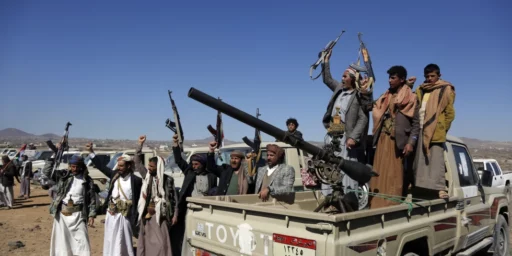International Implications of the Drop in Oil Prices (Updated)
The price of a barrel of oil is almost a third of what it was earlier in the year and expected to go lower:
OIL PRICES could drop below $40 per barrel this month and even further next year due to the global economic downturn, visiting officials of energy information provider Platts yesterday said.
“Prices will continue to go down. We seem to be near the floor prices but then it still going down below $40 per barrel by year-end,” said Jorge Montepeque, Platts global director of market reports.
“Some people are talking about oil prices hitting $35 a barrel,” he added.
From a record high of over $147/barrel just this June, driven by factors such as rising demand and supply concerns, crude is now trading at around $46/barrel as the worldwide economic crisis bites.
Prices are expected to fall further at the start of 2009, said Mr. Montepeque, who addressed a forum on pricing.
“The first quarter is always typically where prices hit the lowest level, essentially March or April, because demand tends to go down,” he said.
This is great news for oil consumers but lousy news for oil producers. Just last week King Abdullah of Saudi Arabia was complaining that “the fair price for oil is $75 a barrel”. Oddly, I don’t remember him seeing things that way when the world price was $146 a barrel.
The falling price of oil has thrown the Russian economy into a tailspin:
The Russian economy, which has expanded at 7 percent a year since 1999, may grow by 1 or 2 percent in 2009, according to Gary Dugan, Merrill Lynch & Co.’s chief investment officer, who predicts an average oil price of $42 a barrel in the first half of next year. The World Bank foresees growth of 3 percent.
Putin promised to avoid “sharp jumps” in the value of the ruble as it fell to the lowest level in almost three years against the dollar. Russia’s international reserves, the world’s third largest, have fallen 24 percent since reaching a peak of $598.1 billion in August as the central bank sold foreign currencies to prop up the national currency, down 16 percent against the U.S. dollar since Aug. 1.
Unemployment there is expected to rise to 10 or 11%.
The falling price of oil is likely to have an impact on areas of concern other than Russia and the KSA including Iran, Pakistan, India, and China. It’s likely to be good news for India, China, and Pakistan. Not long ago Pakistan obtained a World Bank loan much of which was needed to keep its oil subsidies up. That’s less likely to be a problem going forward.
Oil at $36 or even $46 a barrel isn’t the drag on China’s or India’s budgets that $146 dollar a barrel oil is. Iran, contrariwise, will be less able to pursue expensive development projects than it otherwise might have been.
I’d be interested in hearing the thoughts of the commenters on what the likely international implications might be going into 2009 of the low price of crude oil.
UPDATE
The falling price of oil is already causing problems for Mexico:
After expanding by 3.2% in 2007 to $900 billion, Mexico’s GDP growth will slow to 1.5% this year and tumble to somewhere between zero and 0.7% in 2009, predicts Raúl Feliz, an economist at CIDE, a Mexico City think tank that specializes in economics and politics. While some of that meager expansion will come from government stimulus spending, its hands are tightly tied because state-owned oil monopoly Pemex (Petróleos Mexicanos) contributes 37%–$80 billion in 2008–of federal revenue. Next year analysts expect a plunge in petrodollars. Unemployment will jump from its current 4.1%. Throw in part-time workers, who account for roughly one-third of GDP, and the jobless figure soars to 10%. Feliz expects that number to reach 12% next year.
This couldn’t come at a worse time for Mexico. Not only have remittances, the country’s other major source of foreign exchange, been slowing for the past year or so but the country’s embroiled in a war with narcotics traffickers. Some have suggested that war has the potential to delegitimize the government which in turn could throw the country into chaos.






I wonder if something isn’t being lost in the translation, here. I gather that his concern is that current prices are getting uncomfortably close to his production cost.
Mmpphhff. Buying centrefuges, for example.
My guess is that the price drops will postpone CAFE like mandates. That will play into the future of he big trhee, I think, and certainly into any talk of a bailout.
Global wamring scare mongers, too, will find themselves on the outs to a larger degree than they are already. (I know, bad pun)
Since so much of the western economy is built on energy and it’s uses, it seems to me also that lower energy costs will serve to soften the blow of any economic crisis.
*A fracturing of OPEC? (fracturing, not a break up) Not sure how this will play out as they all cut each others throats trying to keep their revenues up.
*No oil revenue sharing plan in Iraq? The Kurds will make an even stronger play for the northern oil fields as Maliki’s hand becomes weaker.
*A drop in popularity for Hugo Chavez? He certainly won’t be able to fund all of his ambitious socailistic plans, and I suppose it could even mean the end of his drive to become “President for Life”.
My Prius is not as cool as it was a year ago … but it’s nice not being able to fit a $20 in the tank.
(If I really have to get defensive I’ll say my carpool stickers still work. Overall the best car-as-investment I’ve ever had. Last year I could have sold it with 30K miles for the purchse price. This year … maybe a bit less.)
The Middle Eastern sovereign wealth funds have been huge capital providers to the US, assisting to finance the twin deficits and avoiding large US interest rate increases. Will the drop in oil prices be large enough to restrict the ME SWF’s US investment? That requires a quantitative anlysis of capital flows beyond my access to the required data. But I would be watchful.
Also, what do these lower prices mean for technologies such as oil shale and oil sands extraction? If I recall correctly $65/bbl +/- is considered the go, no-go for these technologies. Will Canada’s current oil shale boom go bust?
Lastly, this should take pressure off of the dollar related to fears the ME would stop pricing oil in dollars. Perhaps this is one reason for its recent increase.
Absolutely, odograph. That’s a serious point that I’d thought of mentioning in the body of the post. $35/barrel oil pushed down by lack of demand presents less motivation for urgent action on carbon production while making the economic argument for it that much harder to make.
I’m a big enviro and fast cars do look a little more appealing, even to me. My two previous cars were a Honda S-2000 roadster and a WRX turbo wagon … before I started leading the good life … and getting my speed outlet on the Santa Cruz Superlight.
Pluses to the mountain bike are 1) no highway patrol, and 2) less likely to cause collateral damage with bad judgment.
I walked away from owning half a dozen fast cars never crashing one and never hurting anyone … figure it was record I wanted to end with.
Actually, Abdullah and the Saudis argued that oil prices were too high.
The fears were several:
That too high a price would lead to global economic problems;
That too high a price would lead to replacements of oil;
That too high a price, fueled by speculation, would be a bubble that would eventually burst, damaging oil producers who built budgets around the inflated price.
BTW, Saudi Oil Minister Naimi clarified Abdullah’s ‘$75/bbl’ remark: Saudis Suggest $75/bbl Price for Oil. His point was that $75 was a reasonable price to support marginal production.
Dave — thanks for the nod — the lack of a big liquidity pool for the Mexican government in the form of much lower oil prices and minimal international cheap credit could be extraordinarily dangerous.
Also — are you having issues with the Glittering Eye host as I have been getting an error message from LunarPages the few times I have tried to go there today.
Yeah, my web host is moving physically. I thought they’d be back up hours ago. I’ve got a support call in (probably along with thousands of others).